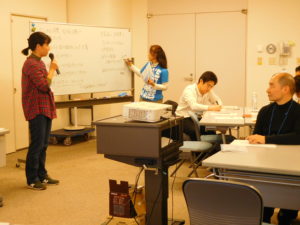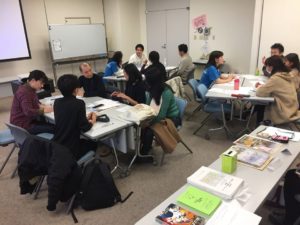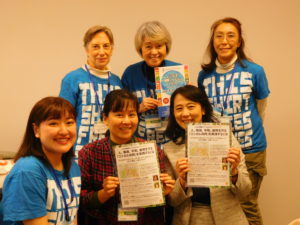The NFSJ seminar “How to practice ‘ethical consumption’ to protect human rights, environment, peace and animal rights” was held on February 15 as part of Yokohama International Forum 2020. The speakers were Mariko Arikawa, a sustainable PR planner and ethical consumption coordinator, and Mariko Yamaoka, the director of Not For Sale Japan. The forum was held when people just started to worry about the spread of COVID-19, so the number of participants was as half as the past years. Our seminar was attended by 20 people including staff and speakers in the room that seats 36 people.
Ms. Arikawa is well-versed in so-called “green purchasing” and ethical consumption. She explained how and what to buy ethically, in particular, to protect environment. She took tea as an example and compared the data of price and carbon dioxide emissions in the two cases: pouring home-brewed tea in a bottle and buying tea in plastic bottles.

When hearing of ethical consumption or fair trade, a lot of people would feel pressured, thinking they would have to change their whole life-style. But Ms. Arikawa says quite differently: “You can just add one ethical factor to other factors of your purchasing decision like preference and price. In Japan, 49 % of the whole “consumption” amount is categorized “home purchases”, so it is more likely to create bigger change by changing the action of each of the consumers.
Yamaoka of NFSJ talked about ethical consumption in terms of human rights. Behind the products and services we buy are exploitative structures: for example, foreign technical intern trainees and students come to Japan after paying deposit and other cost by borrowing money and find themselves deeply stranded in the slave-like labor condition. But as a consumer, it is hard to discern if this kind of structure exists behind the certain product we buy. “Ethical Report Card of Companies” is one of the possible ways to choose ethical companies, along with buying fair trade products.

In the discussion time, all participants were divided into groups with 4-5 members and shared their own experience of sustainable purchasing and talked about ideas to promote ethical consumption. And in the sharing time, variety of ideas were presented, such as buying directly from the producers, creating system of domestic fair trade, telling stories behind the products, promoting products by creating podcast programs, etc. We were all glad by the outcome of the event where participants exchanged their views and ideas lively and in a very friendly atmosphere.
